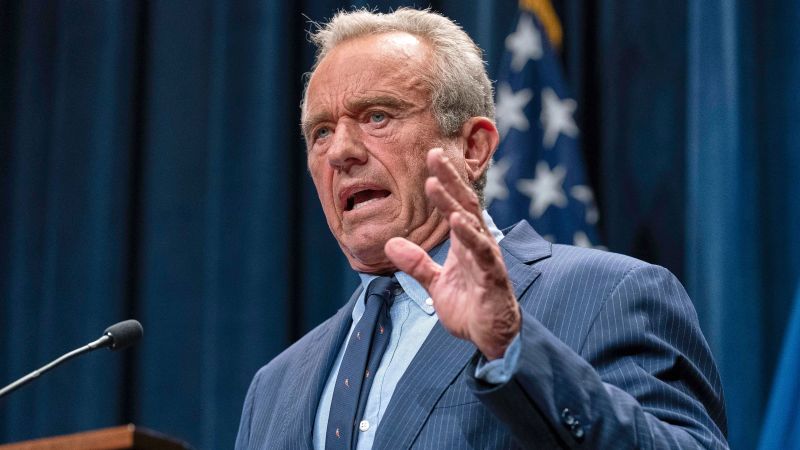In a recent news conference marking his inaugural address as the secretary of the U.S. Department of Health and Human Services (HHS), Robert F. Kennedy Jr. made a striking declaration regarding the rising rates of autism in the United States. He characterized this spike as a “preventable” public health crisis, attributing the burgeoning prevalence to an environmental toxin that he insists needs immediate attention. This bold stance has ignited a robust debate as advocates for individuals with autism have swiftly criticized Kennedy’s assertions as not only harmful but also deeply misleading, underscoring the complexity of autism as a condition that is substantially influenced by genetic factors.
The contention surrounding autism’s increasing prevalence isn’t new. Experts in the field of autism research have largely attributed this rising rate to improved awareness and diagnostic capabilities among healthcare providers. A recent report by the U.S. Centers for Disease Control and Prevention (CDC) corroborates this view, indicating that the apparent rise in autism diagnosis can be linked to enhanced access to identification, particularly among previously underserved communities. This perspective is integral to understanding autism’s evolving recognition and acceptance in medical and societal frameworks.
However, during his press conference, Kennedy amplified his argument by labeling those who endorse the conventional explanation as “epidemic deniers.” He denounced the notion that expanding diagnostic criteria and increased recognition of autism are solely responsible for observed increases, urging a paradigm shift in understanding the condition. “One of the things that I think we need to move away from today is this ideology that the autism prevalence increases…are simply artifacts of better diagnoses,” Kennedy stated emphatically, framing the discourse in a manner that seeks to provoke urgency akin to responses for infectious disease outbreaks.
Kennedy’s rhetoric continued to escalate as he called for “real-time data” on autism prevalence, drawing parallels to the swift response society would typically undertake in the event of a measles outbreak. He contended that similar prompt actions should be adopted concerning conditions like diabetes and autism. His sentiments were reinforced by Dr. Walter Zahorodny, an associate professor at Rutgers New Jersey Medical School and a contributor to the CDC report. Dr. Zahorodny echoed Kennedy’s assertions, deeming the escalation of autism rates a critical public health concern that cannot be brushed aside with explanations grounded solely in better diagnosis and recognition.
Kennedy further revealed plans for autism research to fall under a new division of the HHS, the Administration for Healthy America, which will focus on chronic diseases. In the upcoming weeks, he aims to announce new research initiatives aimed at pinpointing specific environmental toxins that may lead to autism. While the scientific community acknowledges the potential genetic components contributing to autism, Kennedy suggested this line of inquiry is a “dead end.” Instead, he pointed to an array of environmental factors including mold, pesticides, and ultrasound exposure as possible triggers. He firmly stated, “Genes do not cause epidemics,” suggesting that a confluence of genetic predispositions and environmental toxins is at play.
The recent CDC report has indicated troubling new statistics regarding autism. In 2022, approximately 1 in every 31 children was diagnosed with autism by age eight, marking a significant increase from 1 in every 36 children just two years prior. The authors of the CDC report noted that these improvements in early autism identification are likely due to more comprehensive community resources and diagnostic practices. However, the study itself drew from surveillance data across 16 areas in the United States, demonstrating variations in autism prevalence linked to the local availability of services.
Kennedy’s remarks have not gone unchallenged. Leading advocacy groups, including the Autism Society of America, have responded critically, asserting that statements framing autism as “preventable” are fundamentally flawed and unjust. They emphasize that such characterizations place unnecessary blame on families and misrepresent autism’s nature as a lifelong developmental condition, rather than a mere epidemic or a chronic disease. Christopher Banks, CEO of the Autism Society, advocated for a narrative grounded in scientific evidence, calling for robust and comprehensive research that heeds established methodologies.
In summary, Kennedy’s statements and subsequent reactions highlight the fraught landscape surrounding autism discourse, framing it as a public health challenge intertwined with social stigma and misunderstanding. The controversy underscores not only the complexity of autism as a condition but also the urgent need for a well-rounded, scientific approach to its research and treatment. The conversation continues as various stakeholders explore the implications of environmental and genetic factors, pushing for a dialogue that advances understanding and inclusivity in the realm of autism.



